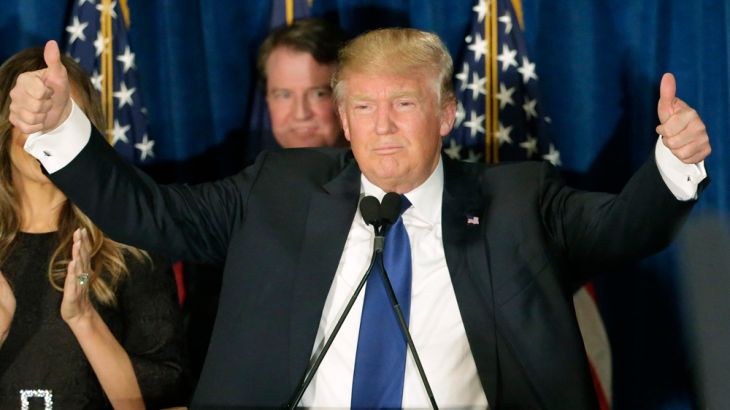Trump and Sanders win big in New Hampshire primary
Unconventional candidates on the far left and right easily win first primary of US presidential campaign.

Republican Donald Trump and Democrat Bernie Sanders coasted to victory on a wave of voter anger in the New Hampshire presidential nominating contest, thrashing traditional US politicians in a display of anti-establishment power.
With 100 percent of the total votes counted on Wednesday in the Republican race in New Hampshire, Trump led the crowded field with 35.3 percent of the votes against his closest rival Ohio Governor John Kasich at 15.8 percent. Texas Senator Ted Cruz, who won the Iowa Caucus last week, was third, followed by former Florida Governor Jeb Bush and Florida Senator Marco Rubio.
On the Democratic side, Sanders overwhelmingly defeated former Secretary of State Hillary Clinton by 60.4 percent to 38 percent with all the votes counted. Sanders made history by becoming the first Jewish American candidate to win a primary, and by garnering the highest number of votes ever in New Hampshire primaries. Clinton won New Hampshire in 2008 against Barack Obama, who went on to become president.
|
|
| How much will New Hampshire’s ‘independent’ voters affect the US elections? |
Trump’s win solidifies his front-runner status in the race to be the party’s White House nominee in 2016.
The reality television star’s untraditional campaign has been marked by calls for the deportation of undocumented refugees and temporarily banning Muslims from entering the United States.
Keep reading
list of 4 items‘Absolute power’: After pro-China Maldives leader’s big win, what’s next?
Solomon Islands pro-China PM Manasseh Sogavare fails to secure majority
Pro-China party on course for landslide victory in Maldives election
Sanders, 74, who describes himself as a democratic socialist, is the underdog in the national race against Clinton. He is promising universal healthcare, better paying jobs, and student debt relief.
“What the people here have said is that, given the enormous crises facing our country, it is just too late for the same old, same old establishment politics and establishment economics,” Sanders told supporters at his
headquarters in Concord.
“Together we have sent the message that will echo from Wall Street to Washington, from Maine to California, and that is that the government of our great country belongs to all of the people and not just a handful of wealthy campaign contributors,” Sanders said.
NEW HAMPSHIRE: The little state with the big voice
In his victory speech, Trump, 69, said Sanders “wants to give away our country”. He pledged to have business experts negotiate better trade deals and to “knock the hell out” of Islamic State of Iraq and the Levant fighters.
|
|
Al Jazeera’s Shihab Rattansi, reporting from Sanders’ Concord headquarters, described Sanders’ victory as “a revolution”.
“Hillary Clinton has a trust problem, we just haven’t seen it manifested before. Clinton just didn’t connect with many Democrats in the state,” our correspondent said.
Clinton’s campaign acknowledged that it had lost in New Hampshire.
Campaign manager Robby Mook said in a memo that they had “split” the first two nominating contests – Clinton won Iowa last week – and said that the Democratic nomination would “very likely” be decided in March.
The Clinton campaign said that the support of black and Hispanic voters would be key to victory. The next primary races are in Nevada and South Carolina later this month.
Al Jazeera’s Alan Fisher, reporting from Manchester, New Hampshire, said the success of the two candidates showed that people were “fed up with the political establishment”.
“This is a real display that American voters are fed up with the current system,” Fisher said.
Lara Brown, of the Graduate School of Political Management at George Washington University, told Al Jazeera that the New Hampshire results showed a lot of people were looking at American politics, “and they do believe the system is rigged”.
“They do have a sense when Donald Trump says ‘We’re just not winning any more’, or when Bernie Sanders talks about those people on Wall Street really controlling Washington; I think both of those messages are resonating,” Brown said.
“And while neither [candidate] has a tremendous number of policy solutions that are achievable or realistic in any sort of understanding of the likely structure that will be in place in 2017, the message is still at heart one from voters who think they’ve been left out.”
The general election for president in the US is on November 8.